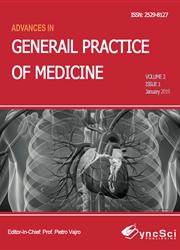Depression of the elderly revealing a primary hypothyroidism
引用次数: 1
Abstract
Introduction Psychiatric manifestations are exceptional during hypothyroidism and are not always easy to diagnose, especially since the clinical signs of hypothyroidism can be confused with those of the depressive syndrome. We report an original observation of depression of the elderly revealing an isolated primary hypothyroidism. Observation A 78-year-old patient, followed for essential hypertension, well-balanced under monotherapy with calcium channel blockers, and without degenerative complications, was referred by her family doctor for depressive syndrome not improved by the specific treatment prescribed and correctly taken for six months. The clinical examination noted in particular macroglossia with dental impressions and dry and cracked skin. The biological assessment showed hypothyroidism with TSH at 28 μmol/l. Thyroid ultrasound showed atrophy of the thyroid gland. The thyroid autoimmunity (anti-thyroglobulin and anti-thyroperoxidase antibodies) was negative. The rest of the biological tests were in the normal range. The diagnosis of Riedel’s thyroiditis was retained and the patient was treated with levothyroxine in progressive doses until TSH normalization was achieved. The evolution on the psychiatric level was also favorable with disappearance of the signs of the depression and the anti-depressive treatment was discontinued. Conclusion Depression is rare, complicating only 4% of overt hypothyroidism and its diagnosis is not always easy, especially in the elderly. Hormone replacement therapy significantly improves the depressive syndrome and protects against cognitive decline. Thus, hypothyroidism screening seems appropriate for any depressive syndrome in the elderly.显示原发性甲状腺功能减退的老年人抑郁症
引言甲状腺功能减退症的精神表现是特殊的,并不总是容易诊断,特别是因为甲状腺功能减退的临床症状可能与抑郁综合征的临床症状混淆。我们报告了一项对老年人抑郁症的原始观察,揭示了一种孤立的原发性甲状腺功能减退症。观察一名78岁的原发性高血压患者,在钙通道阻滞剂的单一治疗下平衡良好,没有退行性并发症,她的家庭医生将其转诊为抑郁综合征,该综合征在六个月内没有通过处方和正确服用的特定治疗得到改善。临床检查特别注意到有牙痕、皮肤干燥和破裂的巨舌症。生物学评估显示甲状腺功能减退,TSH为28μmol/l。甲状腺超声显示甲状腺萎缩。甲状腺自身免疫(抗甲状腺球蛋白和抗甲状腺过氧化物酶抗体)呈阴性。其余的生物测试都在正常范围内。Riedel甲状腺炎的诊断被保留,患者接受了渐进剂量的左甲状腺素治疗,直到TSH恢复正常。随着抑郁症症状的消失和抗抑郁治疗的停止,精神层面的发展也很有利。结论抑郁症是罕见的,只有4%的显性甲状腺功能减退症合并抑郁症,其诊断并不总是容易的,尤其是在老年人中。激素替代疗法显著改善抑郁综合征,防止认知能力下降。因此,甲状腺功能减退症筛查似乎适用于老年人的任何抑郁综合征。
本文章由计算机程序翻译,如有差异,请以英文原文为准。
求助全文
约1分钟内获得全文
求助全文

 求助内容:
求助内容: 应助结果提醒方式:
应助结果提醒方式:


